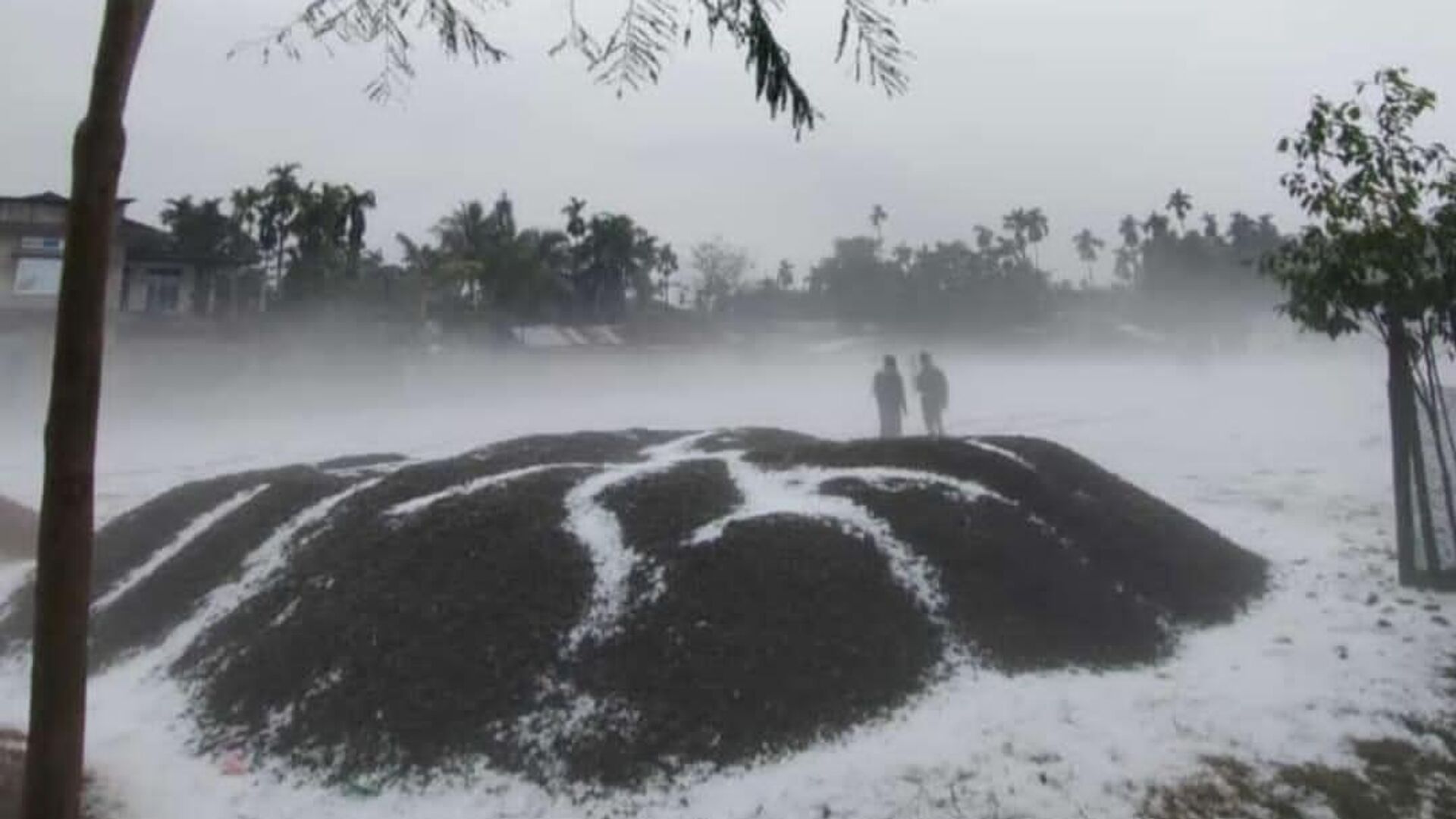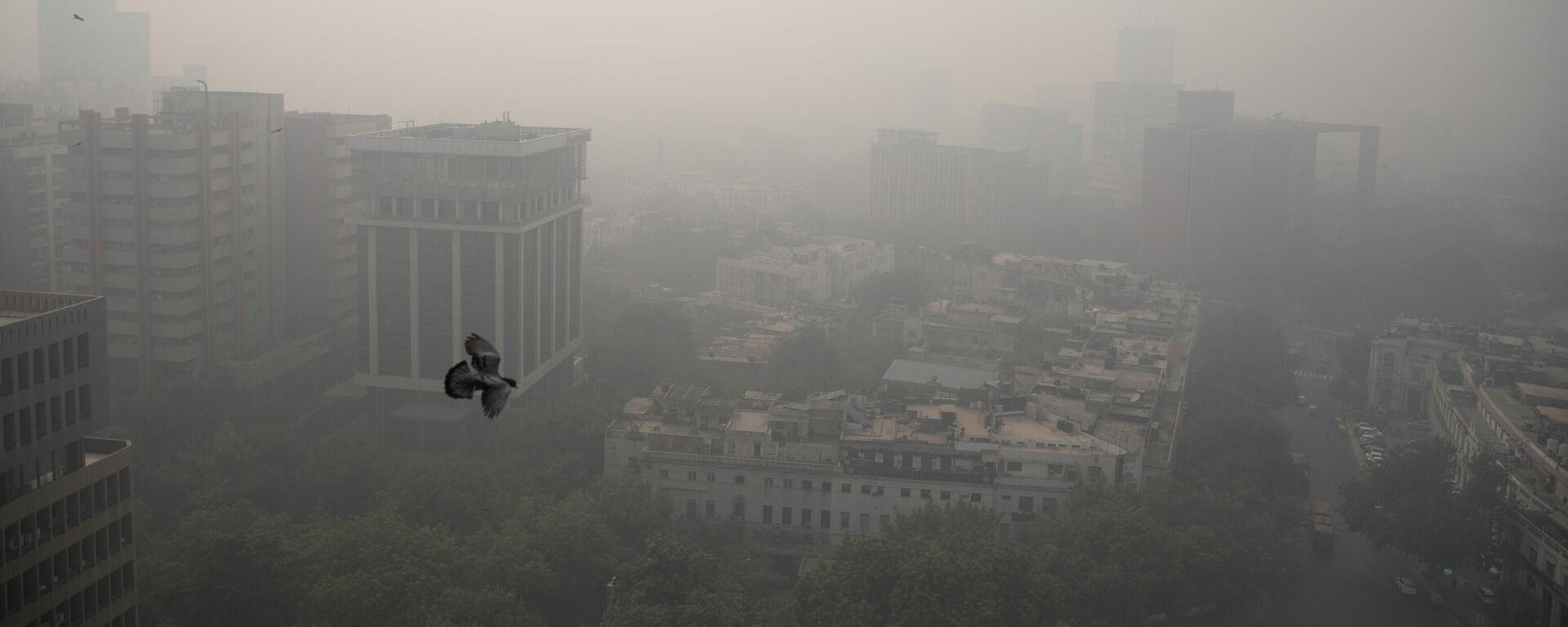https://sputniknews.in/20231030/millions-in-north-west-india-in-high-state-of-alarm-as-winter-brings-increased-pollution-5101706.html
Millions in North-West India Alarmed as Pollution Increases in Winter
Millions in North-West India Alarmed as Pollution Increases in Winter
Sputnik India
By the end of October every year, millions of people in north-west region of India brace for a sharp rise in pollution levels. Children and elderly stay indoors to on most polluted days.
2023-10-30T15:29+0530
2023-10-30T15:29+0530
2023-11-01T12:32+0530
arvind kejriwal
delhi
india
moscow
water pollution
air pollution
plastic pollution
government of india
new delhi
sputnik exclusives
https://cdn1.img.sputniknews.in/img/07e6/0c/1b/268346_0:625:1080:1233_1920x0_80_0_0_779048cfa5d3e95522dff20e340fd719.jpg
It’s that time of year again when many schoolchildren and other vulnerable people, including the old and infirm, will be forced to stay at home and wear masks to save them from the highly polluted air that people in Delhi and its adjoining areas of north-west India breathe.According to reports, as many as 39 Indian cities were on the list of 50 of the world’s most polluted cities based based on average atmospheric particulate matter (PM2.5) levels for 2022 where a reading above 12 micrograms per cubic metre is considered unhealthy.Sputnik India has polled a number of people to find out how they prepare themselves - and schoolchildren in particular - to deal with the extreme weather onslaught that has become a new normal for all residing in north-west India.Ramcharan Verma, who has a six-year-old son, told Sputnik India that it becomes very difficult for children to attend school when the air is not breathable.Parv Kumar, a pupil in Class IX at the prestigious St Columba’s School in Delhi, said it was better for classes to be online during winter when one suffers because of the cold and the pollution.Parv’s elder brother, Rishit, a pupil in Class XI at the same school, told Sputnik India that the idea of taking online classes is far better than going to school every morning during those foggy days when the air is thick with pollution.On being asked if he had any suggestion for the authorities, he said: "It’s something that cannot be overlooked. My governments - both the Arvind Kejriwal-led Delhi Government and the Union Government of India - must do everything possible to fix the issue of pollution as this is something that cannot be ignored."I must not do anything that adds to the existing pollution levels. I must plant trees and look after them as they grow; also I would try and use public transport facilities as and when required," he added in answer to the question from Sputnik India what he would do to help improve matters.Ishaan, a third-year student at Delhi University's St Stephen's College, told Sputnik India that the government should take a holistic approach to tackling pollution, focusing on the causes. "Using water sprinklers to reduce pollution is inefficient as it requires a huge amount of water," Ishaan said."The government ought to spend money on cutting-edge pollution prevention techniques. Sophisticated air-filtration systems for industrial facilities and effective waste management systems are a few such examples."We can reduce the need for temporary fixes such as water sprinklers by concentrating on removing the sources of pollution," he suggested.He also said it was crucial to encourage people to use public transport instead of their private vehicles to travel.He also stressed the need to educate people about the issue.A businessman, who did not wish to be named, said that the governments should allow people to work from home wherever possible.The Delhi Government and central government agencies have started working to ensure a smooth life for city dwellers by adopting a number of measures.
https://sputniknews.in/20231004/delhi-govt-launches-247-green-war-room-to-combat-worsening-air-quality-4588319.html
delhi
india
moscow
new delhi
Sputnik India
feedback.hindi@sputniknews.com
+74956456601
MIA „Rossiya Segodnya“
2023
Sushil Kumar
https://cdn1.img.sputniknews.in/img/07e7/0a/14/4972259_0:0:613:612_100x100_80_0_0_f89d4c7eaa17d23ebb41934f3e07e508.jpg
Sushil Kumar
https://cdn1.img.sputniknews.in/img/07e7/0a/14/4972259_0:0:613:612_100x100_80_0_0_f89d4c7eaa17d23ebb41934f3e07e508.jpg
News
en_IN
Sputnik India
feedback.hindi@sputniknews.com
+74956456601
MIA „Rossiya Segodnya“
Sputnik India
feedback.hindi@sputniknews.com
+74956456601
MIA „Rossiya Segodnya“
Sushil Kumar
https://cdn1.img.sputniknews.in/img/07e7/0a/14/4972259_0:0:613:612_100x100_80_0_0_f89d4c7eaa17d23ebb41934f3e07e508.jpg
pollution, delhi, north-west india, air pollution, students, delhi university, government efforts, world’s most polluted cities
pollution, delhi, north-west india, air pollution, students, delhi university, government efforts, world’s most polluted cities
Millions in North-West India Alarmed as Pollution Increases in Winter
15:29 30.10.2023 (Updated: 12:32 01.11.2023) By the end of October every year, millions of people in the north-west region of India brace themselves for a sharp rise in pollution. Children and the elderly stay indoors on the most polluted days.
It’s that time of year again when many schoolchildren and other vulnerable people, including the old and infirm, will be forced to stay at home and wear masks to save them from the highly polluted air that people in Delhi and its adjoining areas of north-west India breathe.
According to reports, as many as 39 Indian cities were on the list of 50 of the world’s most polluted cities based based on average atmospheric particulate matter (PM2.5) levels for 2022 where a reading above 12 micrograms per cubic metre is considered unhealthy.
Sputnik India has polled a number of people to find out how they prepare themselves - and schoolchildren in particular - to deal with the extreme weather onslaught that has become a new normal for all residing in north-west India.
Ramcharan Verma, who has a six-year-old son, told Sputnik India that it becomes very difficult for children to attend school when the air is not breathable.
"I make sure that my son stays at home on the most polluted days. However, I'm thankful to the school authorities as they generally close school on such days or make arrangements for online classes for primary section students," he said.
Parv Kumar, a pupil in Class IX at the prestigious St Columba’s School in Delhi, said it was better for classes to be online during winter when one suffers because of the cold and the pollution.
"I don’t feel like wearing masks as they cause trouble. I can’t speak properly when they're on. I did not like using them even during the Covid-19 pandemic, but my teachers and parents always wanted me to keep them on," he said.
Parv’s elder brother, Rishit, a pupil in Class XI at the same school, told Sputnik India that the idea of taking online classes is far better than going to school every morning during those foggy days when the air is thick with pollution.
"One ends up being exposed to something that can kill - if not immediately, certainly in the long run," he said, adding that the infrastructure built during the Covid-19-enforced lockdowns has turned out to be a blessing as many classes can now be taught online, which spares thousands of children from going out into the worst pollution.
On being asked if he had any suggestion for the authorities, he said: "It’s something that cannot be overlooked. My governments - both the Arvind Kejriwal-led Delhi Government and the Union Government of India - must do everything possible to fix the issue of pollution as this is something that cannot be ignored.
"I must not do anything that adds to the existing pollution levels. I must plant trees and look after them as they grow; also I would try and use public transport facilities as and when required," he added in answer to the question from Sputnik India what he would do to help improve matters.
Ishaan, a third-year student at
Delhi University's St Stephen's College, told Sputnik India that the government should take a holistic approach to tackling pollution, focusing on the causes. "Using water sprinklers to reduce pollution is inefficient as it requires a huge amount of water," Ishaan said.
"The government ought to spend money on cutting-edge pollution prevention techniques. Sophisticated air-filtration systems for industrial facilities and effective waste management systems are a few such examples.
"We can reduce the need for temporary fixes such as water sprinklers by concentrating on removing the sources of pollution," he suggested.
He also said it was crucial to encourage people to use public transport instead of their private vehicles to travel.
"Modernising the buses operated by Delhi Transport Corporation (DTC) is one approach," the college student said.
He also stressed the need to educate people about the issue.
"The effectiveness of any anti-pollution campaign depends on raising public awareness. To educate the public on the effects of their personal carbon footprints on the environment and human health, the government should put in place educational initiatives," Ishaan added.
A businessman, who did not wish to be named, said that the governments should allow people to work from home wherever possible.
"People should not be forced to come to the office if they can do their work from home. How effectively this system works was seen during the Covid pandemic. I, for one, would love to stay indoors. Then I won't be using either public or private transport. That's the most I can do to decrease pollution," he said.
The Delhi Government and central government agencies have started working to ensure a smooth life for city dwellers by adopting a number of measures.



